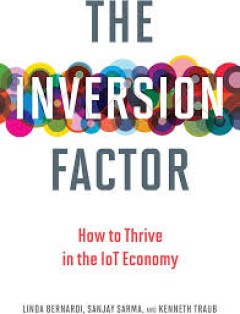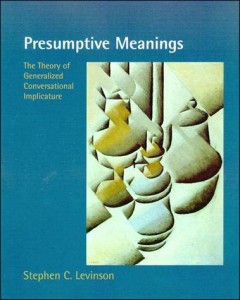Filter by

The inversion factor :how to thrive in the IoT economy
Why companies need to move away from a ""product first"" orientation to pursuing innovation based on customer need.OCLC-licensed vendor bibliographic record.
- Edition
- -
- ISBN/ISSN
- 9780262344937
- Collation
- 1 online resource (232 pages) :illustrations.
- Series Title
- -
- Call Number
- -

Presumptive meanings :the theory of generalized conversational implicature
This is the first extended discussion of preferred interpretation in language understanding, integrating much of the best research in linguistic pragmatics from the last two decades. When we speak, we mean more than we say. In this book Stephen C. Levinson explains some general processes that underlie presumptions in communication. This is the first extended discussion of preferred interpret…
- Edition
- -
- ISBN/ISSN
- 9780262278256
- Collation
- 1 online resource (xxiii, 480 pages).
- Series Title
- -
- Call Number
- -

Warren's Abstract Machine: A Tutorial Reconstruction
"This tutorial demystifies one of the most important yet poorly understood aspects of logic programming, the Warren Abstract Machine or WAM. The author's step-by-step construction of the WAM adds features in a gradual manner, clarifying the complex aspects of the design and providing the first detailed study of WAM since it was designed in 1983. Developed by David H.D. Warren, the WAM is an abs…
- Edition
- -
- ISBN/ISSN
- 9780262255585
- Collation
- 1 online resource (xvi, 114 pages) :illustrations.
- Series Title
- -
- Call Number
- -

Does America need more innovators
A critical exploration of today's global imperative to innovate, by champions, critics, and reformers of innovation. Corporate executives, politicians, and school board leaders agree--Americans must innovate. Innovation experts fuel this demand with books and services that instruct aspiring innovators in best practices, personal habits, and workplace cultures for fostering innovation. But criti…
- Edition
- -
- ISBN/ISSN
- 9780262352598
- Collation
- 1 online resource (410 pages).
- Series Title
- -
- Call Number
- -

Specimen Science: Ethics and Policy Implications
Legal, regulatory, and ethical perspectives on balancing social benefit and human autonomy in research using human biospecimens. Advances in medicine often depend on the effective collection, storage, research use, and sharing of human biological specimens and associated data. But what about the sources of such specimens? When a blood specimen is drawn from a vein in your arm, is that specimen …
- Edition
- -
- ISBN/ISSN
- 9780262339711
- Collation
- 1 online resource (440 pages).
- Series Title
- -
- Call Number
- -

Design for resilience :making the future we leave behind
"Designing for resilience is a critical issue of the 21st century. This is the first book-length work that shows us how to design for a future that lasts, and why we should want to"--OCLC-licensed vendor bibliographic record.
- Edition
- -
- ISBN/ISSN
- 9780262374460
- Collation
- 1 online resource
- Series Title
- -
- Call Number
- -

Invention and innovation :a brief history of hype and failure
"Smil presents the long history and modern infatuation with invention and innovation. Meticulous as always, these vast realms of human ingenuity are organized into sensible categories: inventions that went from welcome to undesirable, inventions that dominate and missed the mark, inventions we still dream about, and lastly, the exaggerations, myths, and wise expectations for innovations we need…
- Edition
- -
- ISBN/ISSN
- 9780262374262
- Collation
- 1 online resource
- Series Title
- -
- Call Number
- -

On the brink of Utopia :reinventing innovation to solve the world's largest p…
"The book offers a framework for how to make innovation leaps more likely - and shows how radically improved technology can help solve the major challenges the world currently faces"--OCLC-licensed vendor bibliographic record.
- Edition
- -
- ISBN/ISSN
- 9780262376259
- Collation
- 1 online resource.
- Series Title
- -
- Call Number
- -

The unnaming of Kroeber Hall :language, memory, and iconoclasm
"A balanced attempt to understand the controversy over renaming a building on the campus of UC Berkeley"--OCLC-licensed vendor bibliographic record.
- Edition
- -
- ISBN/ISSN
- 9780262377263
- Collation
- 1 online resource
- Series Title
- -
- Call Number
- -

The evolution of techniques :rigidity and flexibility in use, transmission, a…
A novel, interdisciplinary exploration of the relative contributions of rigidity and flexibility in the adoption, maintenance, and evolution of technical traditions. Techniques can either be used in rigid, stereotypical ways or in flexibly adaptive ways, or in some combination of the two. The Evolution of Techniques , edited by Mathieu Charbonneau, addresses the impacts of both flexibility and …
- Edition
- -
- ISBN/ISSN
- 9780262378390
- Collation
- 1 online resource (308 pages).
- Series Title
- -
- Call Number
- -
 Computer Science, Information & General Works
Computer Science, Information & General Works  Philosophy & Psychology
Philosophy & Psychology  Religion
Religion  Social Sciences
Social Sciences  Language
Language  Pure Science
Pure Science  Applied Sciences
Applied Sciences  Art & Recreation
Art & Recreation  Literature
Literature  History & Geography
History & Geography